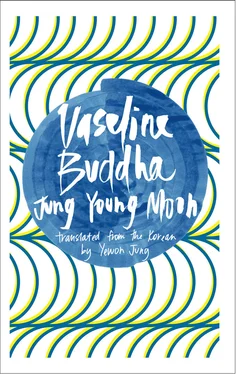Jung Young Moon - Vaseline Buddha
Здесь есть возможность читать онлайн «Jung Young Moon - Vaseline Buddha» весь текст электронной книги совершенно бесплатно (целиком полную версию без сокращений). В некоторых случаях можно слушать аудио, скачать через торрент в формате fb2 и присутствует краткое содержание. Год выпуска: 2016, Издательство: Deep Vellum Publishing, Жанр: Современная проза, на английском языке. Описание произведения, (предисловие) а так же отзывы посетителей доступны на портале библиотеки ЛибКат.
- Название:Vaseline Buddha
- Автор:
- Издательство:Deep Vellum Publishing
- Жанр:
- Год:2016
- ISBN:нет данных
- Рейтинг книги:3 / 5. Голосов: 1
-
Избранное:Добавить в избранное
- Отзывы:
-
Ваша оценка:
- 60
- 1
- 2
- 3
- 4
- 5
Vaseline Buddha: краткое содержание, описание и аннотация
Предлагаем к чтению аннотацию, описание, краткое содержание или предисловие (зависит от того, что написал сам автор книги «Vaseline Buddha»). Если вы не нашли необходимую информацию о книге — напишите в комментариях, мы постараемся отыскать её.
." — Pak Mingyu
A tragicomic odyssey told through free association scrubs the depths of the human psyche to achieve a higher level of consciousness equal to Zen meditation. The story opens when our sleepless narrator thwarts a would-be thief outside his moonlit window, then delves into his subconscious imagination to explore a variety of geographical and mental locations — real, unreal, surreal — to explore the very nature of reality.
Jung Young Moon
Vaseline Buddha — читать онлайн бесплатно полную книгу (весь текст) целиком
Ниже представлен текст книги, разбитый по страницам. Система сохранения места последней прочитанной страницы, позволяет с удобством читать онлайн бесплатно книгу «Vaseline Buddha», без необходимости каждый раз заново искать на чём Вы остановились. Поставьте закладку, и сможете в любой момент перейти на страницу, на которой закончили чтение.
Интервал:
Закладка:
Still, I had a lethal dose of sleeping pills, which I could use whenever I wished, a part of which I kept in a music box I bought as a souvenir on a trip. From time to time, I opened the music box to check up on the sleeping pills, and when I looked at them, listening to the music box, they always raised some kind of a hope in me, and put me at ease. Perhaps I could take the sleeping pills and wind the spring, and fall into eternal sleep while listening to the music box play.
I didn’t see phantoms, but I saw signs, visions, that foretold the coming of phantoms before long. Once, in the middle of the night, I suddenly woke up in bed and saw a large black dog quietly sitting in the darkness of the room, and took it into my sleep and let it lead me to a mysterious place, and before I knew it, we were surrounded by a countless number of other large black dogs. Seeing the vision, I thought about having a chat with phantoms when they actually came.
And what enabled me to just barely endure the depression that seemed as if it would lead to death were the thoughts I had in secret. Thinking those thoughts, I smiled to myself at times. And the smile I smiled to myself in secret, while rereading Molloy for the first time in a long time, during days when there was almost nothing to smile about, seemed my only genuine smile, and the smile, which wasn’t different from a certain kind of sneer, was directed at strange things. But at times, all kinds of smile, not just that smile, seemed strange, and awful as well.
I applied modifiers, such as corrosive, or sparkling, or coagulative, to my smile, and thought that I could apply them to my dizziness as well. In any case, such modifiers endowed a smile and dizziness with physical characteristics, and I felt that my smile and dizziness were physical states.
But from some time on, I no longer smiled even that smile, and I felt as if I were an empty house where no sound was heard anymore, abandoned by the people who had once lived there, talking and laughing. I also had the vague thought that perhaps my smile, which had vanished like an erased figure in an ancient wall painting, could be found only in the expression of a character in a novel I hadn’t yet written.
And the thought led to some thoughts on smile or laughter itself. The ability to smile or laugh is probably one of the things that distinguish humans from other animals. I don’t know if other animals smile or laugh, but it doesn’t seem that they burst out laughing as humans do, or quietly smile to themselves. It seems that animals only make a pleased sound or wag their tails in contentment. But humans smile or laugh when they’re having an interesting experience, when they’re in an awkward situation in which they don’t know what to do, and even over nothing at all. And sometimes, they laugh until their stomachs hurt, or chuckle, or smile reluctantly, about trivial things, or at other times about something huge, or even as they’re trembling with anger over life. Smile or laughter is something that’s the closest to, or depending on circumstances, the furthest away from, humans. Smile or laughter, which is so familiar to humans, is actually not as simple as it seems, and difficult to understand. For example, let’s take a look at some different kinds and aspects of smile and laughter. They are countless, including a hearty laughter, a wry smile, a sneer, a smile of satisfaction, a dumbfounded smile, a foolish smile, a grin, a loud laughter, a giggle, a quiet smile, a groveling smile, a cunning smile, a smile you put on when you look down on someone or when you’re not pleased with someone, just before you’re stripped of a smile, a nasty smile, a big smile that spreads across your face, a big nasty smile that spreads across your face, and so on. And then there’s a crooked smile. I’m not sure what a crooked smile is exactly, but my smiles always have the feel of one.
There’s no other expression of human emotion that has as many qualities and aspects to it as does smile or laughter, which can be preceded by many descriptive words. Laughter can easily arise in inappropriate situations, and in fact, it often arises from the discrepancy between a person and the situation he’s faced with. Smile or laughter itself, of course, doesn’t function as a full emotion, nor is it something that can be categorized as an emotion, but it reveals the complexities of the heart, being linked to various emotions, and establishes the workings of the mind, interacting with the senses. In addition, smile or laughter, which is the most complex emotional reaction, exerts a powerful influence on emotion and thought. For instance, a person can smile or laugh while deep in sorrow, or when his anxiety reaches its height, and such smile or laughter can change or dispel the sorrow or anxiety. Smile or laughter is the most innocent yet cunning at the same time, the most frivolous yet just as profound, and the most naïve, yet evil. But it’s difficult to contemplate evil sorrow, frivolous emptiness, or cunning solitude. The smile or laughter of a newborn baby is probably the most innocent and beautiful thing in the world, but the smile or laughter of someone taking pleasure in abusing someone is evil beyond measure. Perhaps the reason why smile or laughter can so easily change in nature is because unlike emptiness or boredom or such, in which state you can’t help but stay for a while once you’re in it, smile or laughter is a state in which it’s difficult to stay, because smile or laughter is something so unpredictable that it can betray itself. Smile or laughter, which is actually a subtle and complex movement of facial muscles and the mind, is an anthropological object of study as well as a psychological phenomenon (I vaguely imagine that the decisive factor in the human evolution from apes was the human smile or laughter, and humans’ awareness of their own smile or laughter). In addition, smile or laughter is a philosophical topic, and many philosophers, in fact, considered smile or laughter from a philosophical point of view.
But one of the problems surrounding laughter is that today, there’s an excess and abuse thereof. Laughter, in fact, has become a sublime virtue as well as a sublime vice of the day. Laughter, of course, didn’t become such on its own. People seem to be suffering from an obsession to laugh, and steeped in the wrong belief that they can forget past hurts and present sufferings and move forward only by doing so. Fundamental human emotions, such as a sense of emptiness, boredom, loneliness, anxiety, sadness, and unease have become something negative that should be avoided as much as possible, and laughter rules in splendor in the place from which they have been cast out (I picture laughter looking down on the sadness of the emotions it has driven out, without even hiding its nastiness, which, in a way, seems to be the self-portrait of the day). In short, the idea that laughter is desirable, no matter what, is prevalent, like a superstition. But is it true that laughter is just desirable? It’s true that laughter has a great power that makes it possible to endure a difficult life, brings the hope that you can break away from an oppressive condition, purifies the mind the way profound sorrow does, assimilates you with the object of laughter, just as when you experience something beautiful, and that the more painful the present situation is, the more necessary is laughter. But the negative effects of laughter are just as serious as the positive. Laughter, by its inherent nature, can cunningly make an individual turn his eyes away from his life and the situation with which he’s faced, and make him think less or give up on thinking, thus making him stupid. What good is it to laugh in a futile, unnatural way in the face of a reality that won’t change much at all through a little laughter? You could be even more miserable when you face your real self after laughing in vain. In a way, laughter exercises an oppressive ideological function in this era, just as an oppressive system did. I think that the laughter forced upon you by the many soap operas, shows, and movies that you couldn’t possibly watch if you had any refinement at all, that drain you of all energy if you watch them, is putting everyone in a state of insensibility and numbness. What those shows, which tell you to laugh in whatever way you can, to laugh until you’re in a daze, but aren’t funny and only make you sad and furious, really propagate is that you should laugh a lot, for that will keep you from thinking, and your troubles will be covered up by laughter, and won’t exist when covered up, and even if they still exist, you’re happy as long as you’re laughing. (There’s nothing more grotesque than a group of people having dinner, laughing as they watch a vulgar comedy program on television.) Genuine laughter always has its beginning in proper humor, and is not separate from the intellect and the reflective power of the intellect. Genuine laughter has enduring strength, but vulgar laughter is strongly volatile, and lacks humor. Sadly, laughter arising from humor, founded in good sense and requiring a natural process, is growing increasingly scarce.
Читать дальшеИнтервал:
Закладка:
Похожие книги на «Vaseline Buddha»
Представляем Вашему вниманию похожие книги на «Vaseline Buddha» списком для выбора. Мы отобрали схожую по названию и смыслу литературу в надежде предоставить читателям больше вариантов отыскать новые, интересные, ещё непрочитанные произведения.
Обсуждение, отзывы о книге «Vaseline Buddha» и просто собственные мнения читателей. Оставьте ваши комментарии, напишите, что Вы думаете о произведении, его смысле или главных героях. Укажите что конкретно понравилось, а что нет, и почему Вы так считаете.












